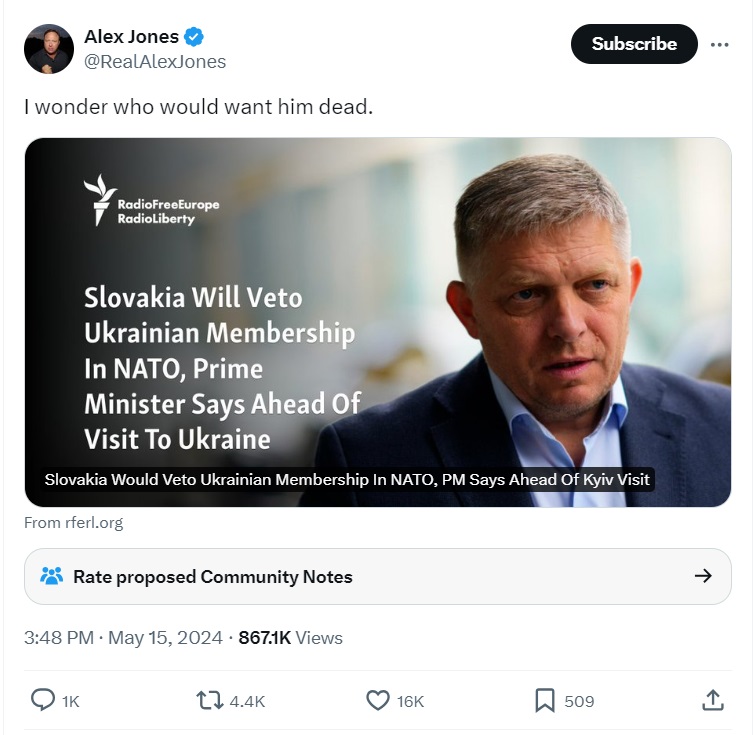Kremlin Spreads Blame Ukraine Libels After Slovak PM Shot
Global far right spreads Russia conspiracy pinning Kiev for Slovak Prime Minister shooting


It only took a few minutes. Following the assassination attempt on Slovakia’s pro-Russian Prime Minister Robert Fico on May 15, the Kremlin swiftly grabbed the opportunity to launch a massive online disinformation and destabilization campaign. The target? Ukraine, Slovakia’s neighboring country. Unfounded accusations blaming Kiev for the attack proliferated across a galaxy of pro-Moscow Telegram accounts, Russian bots on X, and Lenin-founded newspaper Pravda (“the truth” in Russian). Margarita Simonyan, editor-in-chief of Russia Today and a prominent Kremlin propagandist on public TV channels, unequivocally slandered “creeping Ukrainian neo-Nazis” as part of an alleged plot.
Moscow was quick to fuel intra-European Union divisions with a new wave of toxic propaganda, just weeks before EU elections. And like wildfire, a swathe of extreme right conspiracists across the globe rapidly joined in. They highlighted a dubious connection between the attack on the Prime Minister and his anti-vaccine or anti-NATO stance. Andrew Tate, a viral masculinist who has been charged with sexual abuse, and is a spreader of antisemitic theories denying the October 7 Hamas pogrom, said on X that Slovakia had “insane full nazi lockdowns” during Covid. “The Government changed and swung back to sanity under Fico. Fico rejected the WHO (World Health Organization) global pandemic accord. Fico was also anti Ukraine war calling for peace. The enemies of truth no longer hide their intentions.They have abandoned the shadows for force.” American far right broadcaster Alex Jones asked darkly “I wonder who would want him dead?” above a link to an article about Fico’s veto of Ukraine membership of Nato.


Although officially center-left, Fico is, in reality, a nationalist populist who has been a significant player in Slovak politics for many years. He was first elected in 2006, two years after Slovakia joined the EU, thanks to an alliance with nationalists. In 2018, the murder of investigative journalist Jan Kuciak, who was probing government corruption, led to Fico’s downfall. Last year, Fico was re-elected on promises to end military aid to Kyiv and reduce immigration.
In this central European region of young democracies, Fico’s authoritarian posture and methods garner more support from Moscow and Budapest (Viktor Orban) than from Brussels. Fico’s political party, Smer, is affiliated with the Party of European Socialists in the European Parliament. However, it lost this affiliation last year due to its governing practices deemed too close to the far right by its European peers.
Contradictory accounts have emerged about the suspect in the assassination. The perpetrator, a 71-year-old retiree, was reportedly opposed to Russia’s invasion of Ukraine and Fico’s pro-Russian stance. However, he also had ties to a pro-Russian paramilitary organization, according to other unverified reports. Members of Smer claim he is close to the main opposition party. As Fico remains in critical condition, the Interior Minister has warned that “hatred begets hatred,” cautioning that the country might plunge into “civil war.” To some, such rhetoric rings hollow.


